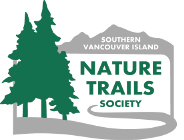Resources
Supporting Resources for the Nature Trails Society
Shared Trail Resources
Trail Standards (Squamish, BC)
“…all public access trails are a “shared resource and a shared use” and as such no public trails are of exclusive use. Different courtesies and “rights of the road” may apply depending on the primary use of the trail” (p. 2).
Shared Use Trails in Canada (2009)
As demand for additional managed trails in Canada is increasing, in future years it will be even more important to share the scarce land resources we have available for recreation (p. 4). The best known example of a shared use trail in Canada is the Trans Canada Trail (p 5). Shared use trails in British Columbia represent a total of 11,220 kilometres (including 978 kilometres of the Trans Canada Trail which are on roads). This sub-total is more than 28% of the total kilometres of trail in BC (2009 data). Trail user conflict is a complex issue that is often best addressed by employing a coordinated and multi-faceted approach to the issues. It may not be possible to completely eliminate conflict; however a pro-active approach to trail management can reduce the potential for conflict as well as provide a framework for dealing with it when it arises (p. 34). Shared use trails are an efficient way to address this issue because multiple trail user groups can access the same resources through cooperation on shared use trail systems. However, there is a need for trail management practices to be applied in order to reduce conflict between user groups (60). Priority should be given to the development of shared use trails wherever appropriate because that is the most efficient way to invest public funds (p 61).
Sharing the Trail (Jasper National Park)
While sharing trails, stay on the trail and treat other users with courtesy and respect. Some trails are restricted to pedestrians only, and creating new trails without authorization is not allowed.
Canadian Trails Study (2010)
The users of trails such as the Iron Horse Trail in Alberta, the Eastern Ontario Trail Alliance trail system in Ontario, the Ceilidh Coastal Trail in Cape Breton and Newfoundland T’Railway all tell us that their experience with a wide variety of different trail users has been very good (p. 48).
Endorsing a Shared Use Trail Network (Mitcham, South Australia)
The growing community trend towards unstructured recreation has influenced the development of Council’s shared use trail network. The social and environment impacts of horse riding, walking and mountain bike riding through Mitcham’s reserves will always be greater than in remote areas. Mitcham Council acknowledges this and therefore in the mid 2000’s endorsed a trails strategy to implement and manage a Shared Use Trail Network.
Shared Trail Conflicts (Australian Alpine National Park, 2018)
“Social value conflicts originate from the formation of shared normative beliefs and negative attitudes adopted from other members of a group to reinforce a sense of belonging to this group, resulting in firm beliefs about socially acceptable activities (Rossi, Byrne, Pickering, & Reser, 2015). Research suggests that values, fundamental principles that filter environmental information, shape beliefs and attitudes, which in turn mediate perceptions as sensors/processors of the environment, resulting in specific behaviour towards other trail visitors (Rossi et al., 2015).” (471).
Isabelle D. Wolf, Greg Brown & Teresa Wohlfart (2018) Applying public participation GIS
(PPGIS) to inform and manage visitor conflict along multi-use trails, Journal of Sustainable
Tourism, 26:3, 470-495, DOI: 10.1080/09669582.2017.1360315
Trail Studies and Reports
Mountain Bike Policy BC Crown land
Mountain Biking Market Profiles for Parks Canada 2010
Industry Overview 2012 – National Bicycle Dealers Association
Cycling – Mountain Biking Sector Profile
Cariboo Mountain Bike Consortium 2013 Annual Report
BC stats Out Door Recreation Biking FINAL
Golden and Rossland MBT Visitor Studies
Toronto Natural Environment Trail Strategy
Sea 2 Sky Economic Impact Study
7 Deadly Sins of Mtn Bike Tourism – Alliance
Cariboo Mtn Bike Consortium Economic Assessment 2012
Economic Impact of Active Silent Sports Enthusiasts – Wisconsin 2014
Economic Significant of Mountain Biking in Rossland and Golden 2011
MBTA Northern BC Mountain Bike Recreation & Tourism Development Strategy
Mountain Bike Tourism Resources
Mountain Biking Tourism in Scotland 2014
Mountain-Bike-Tourism-Plan-March-2010-Final
Mountain-Bike-Visitor-Study_Golden_FINAL_ES
Mountain-Bike-Visitor-Study_Rossland_FINAL
Northern BC Mountain Bike Recreation & Tourism Develoment Strategy Summary Brochure 01162014_2Vk0
Santa Cruz 2007 2007.07.Economic Benefits Mtb Tourism
